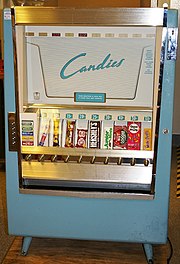 I have an agreement with vending machines. Their job is to take my change and give me what I want. When, as often is the case, I don't receive the reward for my offering, I am furious. My frustration is often proclaimed in an indictment against the machine. "Stupid machine!" I exclaim. I am indignant that the machine has not followed the rules. On the flip side, when I get exactly what I paid for, I walk off merrily enjoying the dispensed with no regard for the dispenser. Why should I? The dispenser has only performed its duty - no hoopla necessary.
I have an agreement with vending machines. Their job is to take my change and give me what I want. When, as often is the case, I don't receive the reward for my offering, I am furious. My frustration is often proclaimed in an indictment against the machine. "Stupid machine!" I exclaim. I am indignant that the machine has not followed the rules. On the flip side, when I get exactly what I paid for, I walk off merrily enjoying the dispensed with no regard for the dispenser. Why should I? The dispenser has only performed its duty - no hoopla necessary.Over the past couple of years, Ryene (my 10 year-old daughter) and I have been discussing vending machines. Specifically, how easy it is to make God a vending machine with all the same arrangements. Last week Ryene pointed out that this mentality didn't arrive with the industrial revolution and the advent of vending machines. She saw it in Luke 17 in Jesus' exchange with the ten lepers.
On the way to Jerusalem he was passing along between Samaria and Galilee. And as he entered a village, he was met by ten lepers,who stood at a distance and lifted up their voices, saying, “Jesus, Master, have mercy on us.” When he saw them he said to them, “Go and show yourselves to the priests.” And as they went they were cleansed. Then one of them, when he saw that he was healed, turned back, praising God with a loud voice; and he fell on his face at Jesus’ feet, giving him thanks. Now he was a Samaritan. Then Jesus answered, “Were not ten cleansed? Where are the nine? Was no one found to return and give praise to God except this foreigner?” And he said to him, “Rise and go your way; your faith has made you well.” (Luke 17.11–19)The lepers in this story understood and obeyed the rules. They didn't interact with the non-leprous and stood at a distance from Jesus. They knew that Jesus had the power to heal. They knew his healing power was bound up somehow with his mercy toward them. When he told them to go and show themselves to the priests, they responded with remarkable obedience and faith. Showing yourself to the priest was an act reserved for those who had already been healed (Leviticus 14:1-32). In going to the priests, they were communicating trust in Jesus implied promise to heal them. Indeed, on the way, they were healed.
To this point in the story, we see a great picture of humility, obedience and faith and, yet, something is missing that can only be revealed by the end of the story. Nine of them went on their way without thanking the one who had healed them. In fact, we are left to decide for ourselves whether they actually even made it to the priests. As Ryene pointed out, they saw Jesus as a vending machine and, when he delivered as expected, no thanks was necessary.
It's remarkable. We can have humility, obedience and even some measure of faith toward God and still miss the picture completely. The nine lepers had all these things and they had themselves at the center of their universe. Jesus' words to the returning Samaritan leper reveals the point of God's healing in our lives. Whether in our redemption from sin, binding our broken hearts or healing our physical bodies, God is looking to be the object of praise not the dispenser of good gifts. The thanks and not the healing is the point.
These lepers eventually experienced more physical aliments which eventually led to their own death. The gift of healing they had received was temporary but the gift of seeing their God, Savior and King was the very substance of eternal life (John 17:3). To miss that is the very root of sin (Romans 1:21,25).
Am I Like One of the Nine Lepers?
When the gifts are the true objects of our affection, we will see it in our gratitude. It's easy to take our spiritual temperature with the wrong thermometer. Often we look for signs of humility, obedience and faith. These are important indicators of life in the Kingdom of God. But the point in this exchange is that these things may exist and our affections may be somewhere else all together. God will not settle for giving us second best. His discipline and withholding is often an expression of that passion. His best comes when our eyes are not fixed on the temporary gift but on the eternal giver.
After receiving the grace we have sought in prayer, do we stop and give legitimate, heart-felt thanks? If, after all my prayer and obedience, my prayers aren't answered, am I quick to indict God with no regard for the previous 10,000 days of His grace? The answers to these questions reveal more of the work of the gospel in our lives than a thousand works of service. If you want to know the real temperature of your heart, put down the "Am-I-Obedient?" thermometer and use the "Am-I-Grateful?" one. It works better.
(Thanks Rye!)
Additional Resources
Burning Out? Don't forget the end to which we labor and strive
Real Gritty Joy: All Things Rubbish
Coming to Jesus without hating what we have left









0 comments:
Post a Comment